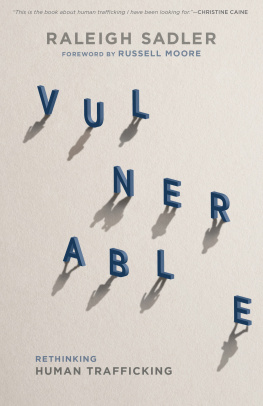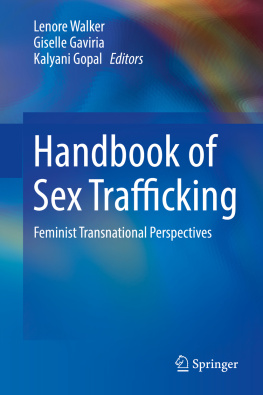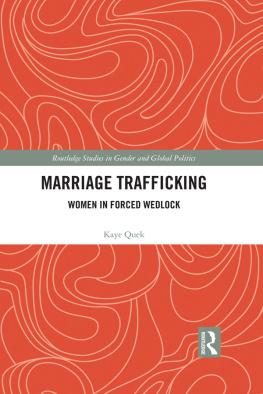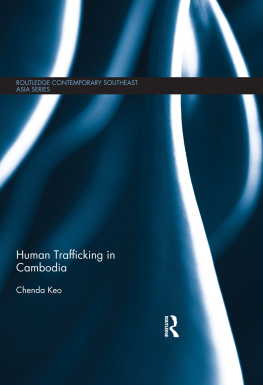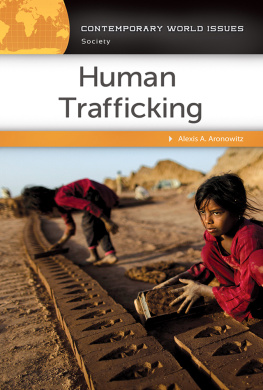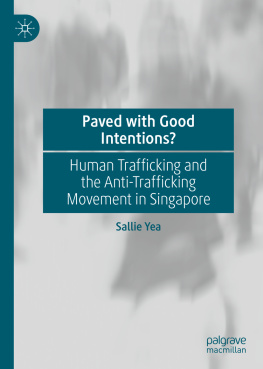TRAFFICKING AND PROSTITUTION RECONSIDERED
New Perspectives on Migration, Sex Work, and Human Rights
TRAFFICKING AND PROSTITUTION RECONSIDERED
New Perspectives on Migration, Sex Work, and Human Rights
SECOND EDITION
edited by
Kamala Kempadoo
with
Jyoti Sanghera and Bandana Pattanaik
First published 2012 by Paradigm Publishers
Published 2016 by Routledge
2 Park Square, Milton Park, Abingdon, Oxon OX14 4RN
711 Third Avenue, New York, NY 10017, USA
Routledge is an imprint of the Taylor & Francis Group, an informa business
Copyright 2012, Taylor & Francis.
All rights reserved. No part of this book may be reprinted or reproduced or utilised in any form or by any electronic, mechanical, or other means, now known or hereafter invented, including photocopying and recording, or in any information storage or retrieval system, without permission in writing from the publishers.
Notice:
Product or corporate names may be trademarks or registered trademarks, and are used only for identification and explanation without intent to infringe.
Library of Congress Cataloging-in-Publication Data
Trafficking and prostitution reconsidered : new perspectives on migration, sex work, and human rights / edited by Kamala Kempadoo, Jyoti Sanghera, Bandana Pattanaik. 2nd ed.
p. cm.
Includes bibliographical references and index.
ISBN 978-1-59451-988-8 (hardcover : alk. paper)
ISBN 978-1-59451-989-5 (pbk. : alk. paper) 1. Human smugglingAsia. 2. Human traffickingAsia. 3. ProstitutionAsia. 4. Forced laborAsia. 5. Transnational crime. 6. AsiaEmigration and immigration. I. Kempadoo, Kamala. II. Sanghera, Jyoti. III. Pattanaik, Bandana, 1960
HQ281.T618 2012
306.74095dc23
2011035982
Designed and Typeset by Straight Creek Bookmakers.
ISBN 13 : 978-1-59451-988-8 (hbk)
ISBN 13 : 978-1-59451-989-5 (pbk)
Contents
Kamala Kempadoo
Jyoti Sanghera
Ratna Kapur
Phil Marshall and Susu Thatun
Lin Chew
Josephine Ho
Melissa Ditmore
John Frederick
Edited by Kamala Kempadoo
Jagori
Jan Boontinand, for the Global Alliance Against Traffic in Women
Aftab Ahmed
Natasha Ahmad
Rebecca Napier-Moore, for the Global Alliance Against Traffic in Women
Kamala Kempadoo
Twenty-first-century Perspectives on Human Trafficking
Kamala Kempadoo
A belief about human trafficking as a contemporary global problem made its way into public consciousness at the start of the twenty-first century, pressed mainly by governments and feminists. It has since become sedimented in everyday life and is regularly broadcast in the media, yet the problem it points to is not new and has been a concern of Western nations since the mid-nineteenth century. At the turn of the twenty-first century, human trafficking was identified by the United Nations as a transnational crime, and was cast by political leaders, alongside terrorism and drug trafficking, as one of the three evils to haunt the globe. Beliefs about human trafficking have also created a veritable anti-trafficking industry as well as a set of durable narratives.1 These narratives have informed law enforcement efforts to control immigration and transnational organized crime, state policies and interventions to closely survey and regulate sex industries, and an array of social work and other activities aimed at undocumented migrants, sex workers, and bonded laborers. Indeed, by 2003, over 900 entities worldwide, including nongovernmental human rights, womens rights, anti-violence, sex-worker rights, and health-care organizations, government organizations, international agencies, and university departments, drew from the narratives and were involved in combating human trafficking (Change 2003). This anti-trafficking activity has since deepened and expanded, with the academic world adding considerable weight and legitimacy to the various narratives. In 2010 alone, around 140 academic books and journal articles were published that explicitly dealt with the intersection of human trafficking and prostitution and many more appeared dealing with subjects such as modern-day slavery, organized crime, child prostitution, forced labor, and international labor migration. The number of publications over the span of the first decade of the twenty-first century is much vaster. Forensic nurses, HIV and other health specialists, social workers, pastors, sociologists, psychologists, criminologists, anthropologists, political scientists, and economists, as well as scholars in womens, gender and sexuality studies, development studies, labor studies, migration studies, black slavery studies, and Latin American and Asian studies have all added their voices to what Emma Goldman coined a century ago as a righteous cry against human suffering (1911).
In reflection upon this explosion of interest during the first decade of the twenty-first century and upon what it has managed to accomplish since the first edition of this book in 2005, some common themes continue and new ones emerge. First, there remain different and competing narratives about human trafficking, which now constitute quite distinct conceptual frameworks or paradigms, with little consensus or agreement among scholars, policy makers, and activists about the problem. Few new narratives have been added, but contestation over the existing ones appears to have become fiercer, due in part to academic interventions. Second, while descriptions and analyses of the perceived problem have become considerably more sophisticated, with expanded areas of social life being implicated, there is a surprising lack of any theoretical breakthroughs since the start of the century. Rather, earlier perspectives are rehearsed, applied to specific national contexts and within new academic disciplines, and used to reveal different shades of the problem. This has led to a deepening of the various narratives but not to any significant shifts in paradigm.2 Third, while a conflation between human trafficking and prostitution underlies some narratives, sex trafficking has emerged as a term that many employ to speak to the nexus between two, and to point to that area that is considered one of the most severe forms of trafficking. Sex trafficking is now the metaphor par excellence for analysis of the degraded state of humanity in the twenty-first century and has become a central vehicle for academic critique of a variety of contemporary social relations of power at local and global levels. Nevertheless, the term is attached to a particular feminist narrative about violence to women and carries a specific meaning. Finally, much of what is debated in the name of a struggle against human rights violations still carries troubling consequences for many people around the world. In particular, the migrant woman in prostitution is taken upexplicitly or notto express a growing unease with an array of social injustices, but her silence, especially that of women from the global South, is overwhelming. In the outpouring of outrage, condemnation, and claims to human rights, she is spoken for and represented, but rarely does she find voice. The migrant woman sex worker becomes the ground for competing claims and theories, silenced by not only the master narratives but also the Western gaze (Doezema 2001; Downe 2007; Mohanty 2003).



